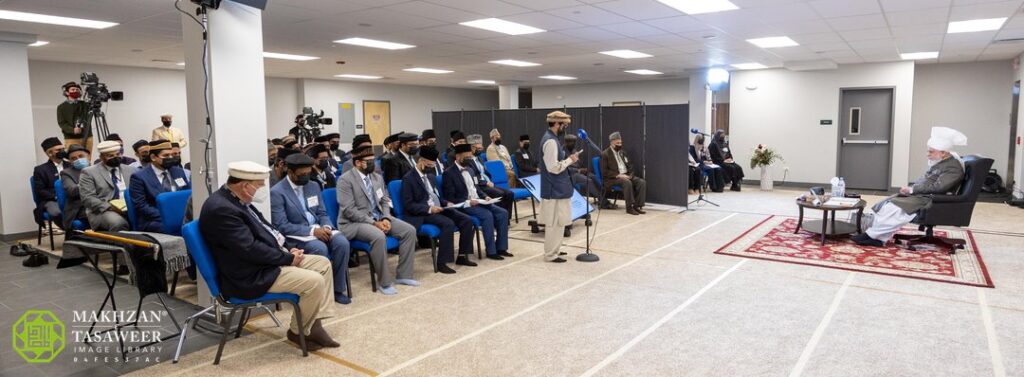Faran Rabbani, USA Correspondent

On 29 September 2022, the Association of Ahmadi Muslim Scientists USA (AAMS-USA) and the Ahmadi Women Scientists Association (AWSA) were blessed to meet with Hazrat Khalifatul Masih Vaa and share their research while also getting valuable guidance and direction from their Imam.
The meeting began with a recitation from the Holy Quran, followed by a brief introduction and report from the president of AAMS-USA Dr Sohail Husain Sahib and then by Dr Nusrat Sharif Sahiba, the AWSA president.
After the brief report on the association’s efforts, its history and its mission to “lead the next Islamic Golden Age”, Huzooraa inquired about the number of PhDs each association had and what impact their research was having.
Huzooraa also asked about their collective target of “achieving 100 Abdus Salams” and the efforts made towards making this a reality. Hazrat Amirul Momineenaa reminded the association that in 2019 during the Ahmadiyya Muslim Research Association (AMRA) conference in the UK, he had reminded Ahmadi Muslim researchers that Hazrat Khalifatul Masih IIIrh had expressed his ardent desire for at least 100 Ahmadi Muslims to follow in the footsteps of Dr Abdus Salam and become eminent scientists by the turn of the first centenary of the Jamaat. Huzooraa said 33 years had passed yet we had not produced the next Abdus Salam.
Hazrat Khalifatul Masih Vaa asked the AAMS and the AWSA presidents about their plans to achieve this goal, to which Dr Nusrat Sahiba replied that “based on our current membership data we have 10 promising candidates and in the next year we may have another ten and by three years, 50% of these Ahmadi Scientists will reach the highest echelons of science, God willing.”
Hazrat Khalifatul Masih Vaa commented, “I hope within the next few years you will have at least one or two [Abdus Salams]”, God willing.
Some members of the associations were able to present a synopsis of their research work in different scientific fields.
Dr Sohail Husain, President of the AAMS, mentioned afterwards that he felt that with Huzoor’s visit, “the heavens have opened up for us. Collectively, we (the Muslim Ummah) have waited 1300 years for this moment. Our Khalifa has come to the centre of worldly knowledge which is the United States and told us that we can excel all others because of our faith”.
Dr Asif Jamil, a faculty instructor at Harvard Medical School in Boston, presented some of his research in the field of neuroscience – specifically brain stimulation techniques and protocols to treat different diseases pertaining to the fields of psychiatry and psychology. Reflecting on the meeting, Dr Asif Jamil said:
“Huzooraa provided me with great feedback and he asked me what I and other Ahmadi scientists were doing in order to bring our research to the masses. If our research had already been taken to the level of application […] This is not only a good question but has also given me a future direction for my research, namely that I should not just think about the lab research but think about how you can develop this technique in a way that it leads to the development of a treatment that can actually make a difference in the world”.
Another participant was Ms Olivia Barber, a PhD candidate from Northwestern University who studies the effect of spraying disinfectants on the creation of bacteria that become resistant to antibiotics over time. Ms Olivia told Al Hakam afterwards that she mentioned to Huzooraa her interest in studying this to find out what the exact changes were in bacteria that caused resistance and about finding a solution to the problem. Huzooraa asked if she had found anything thus far in her research, to which she replied, “at the moment I have not”. She continued to tell us, “However, I felt this was an encouragement to keep searching. I also noticed Huzooraa asking others about how they were planning to apply their work, which made me think it was important to keep in mind the translation of one’s scientific research into practical uses.”
Ms Olivia Barber felt blessed to be a part of this special gathering. She mentioned that “it felt like a turning point in my commitment to this path. I feel that Huzooraa has given us all the guidance and it is now time for us to work to implement his vision and that of the third Khalifarh with dedication and prayers.”
Ms Naila Razzak, another PhD Candidate in the field of Social Sciences at Yale University, had the opportunity to be part of this historic meeting. In her brief presentation before Huzooraa, she mentioned that her field was the Late Antiquity of the Middle East, focusing especially on early Jewish and Christian communities in the region. She also said she studies various texts and inscriptions in order to learn more about the origins, development and interaction of Semitic languages, including Hebrew, Syriac, Arabic and Ethiopic.
Ms Naila Razzak also shared her observations from the meeting with Al Hakam:
“Huzooraa was very encouraging to those striving to make a positive impact through their research, especially to young Ahmadi women when he asked about the ratio of men and women attaining PhDs, which was extremely motivating for me. As I presented to my beloved Huzooraa, he asked whether my field was social science and whether I was still working on finishing my PhD. I was humbled that Huzooraa was so encouraging, even to younger and aspiring scholars and researchers.
“I am humbled and energised by the experience and am now reinvigorated to work harder and strive for a high level of success and dedication to service in accordance with beloved Huzoor’s guidance. This mulaqat was historic for AWSA because of the mission of the association to create 100 award-winning, high-impact scientists and researchers.”
This historic meeting lasted for about 40 minutes.

